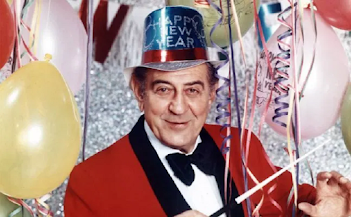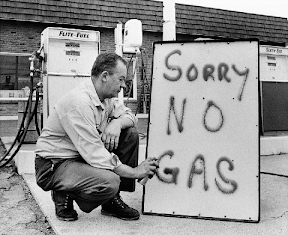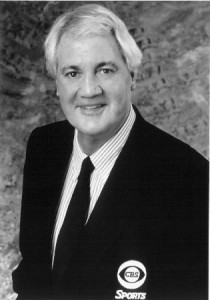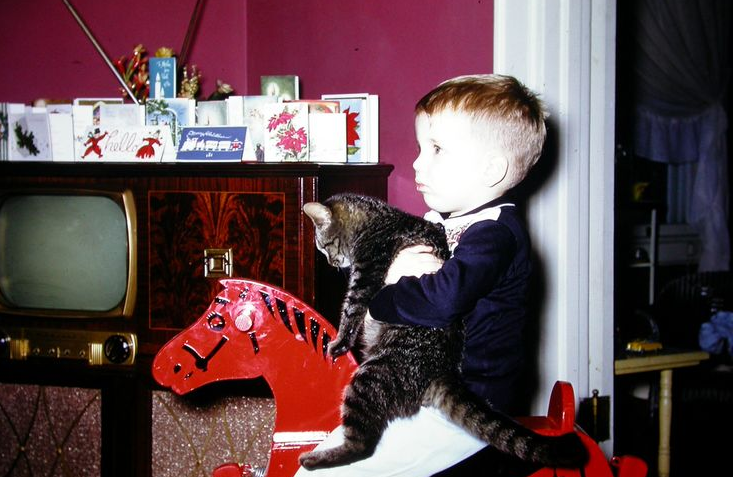As most of you probably know, every few years New Year's Day falls on a Sunday, and when that happens, the whole kit and kaboodle of what makes January 1 unique—the Rose Parade, the bowl games, even hockey's Winter Classic—gets moved to Monday. Everything but the New Year's hangover; I'm afraid you don't get a break there.
I say "most of you," because the last time this happened, I found out there were some people who obviously didn't know this. It came to light when the company I worked for at the time published its schedule for the coming year, which indicated we'd be open that Monday. Now, it was no skin off my back; if we were open, I'd just take the day off. But you know me; I love to throw a spanner in the works. So I emailed the HR department and asked them if they were aware that Monday was a national holiday. No mail delivery, offices closed, that sort of thing. They'd be asking people to work while the parades and games were on, and you know, some people like to watch those. As it turned out, they weren't aware of this, even though it had only been five years since it had last happened. I can almost guarantee, I said, that those parades and games and things wouldn't be happening if they weren't confident people would be home. They thought about it for awhile, and decided to change the calendar. Sometimes you wonder how people like that get to be executives.
(Incidentally, some of you might wonder why this is. It has nothing to do with the NFL, as some people who ought to know better believe; in fact, it dates back to 1893, the first year since the parade's 1890 founding that January 1 fell on a Sunday. "Parade organizers were afraid that the parade would spook the horses located outside of churches along the parade route for Sunday services. The 'Never on a Sunday' exception has been observed ever since even though people no longer use horses to get around Pasadena (or anywhere obviously)." So that should satisfy any curiosity you have.)
I bring this up because January 1, 1956, falls on a Sunday, and so the parade and bowl games are all trooping over to Monday (you'll be able to see it for yourself in Monday's listings). For me, not being the reflective type, what New Year's mostly has meant is football, and there's plenty of it, beginning on Saturday with the Gator Bowl from Jacksonville (1:00 p.m., CBS) pitting Auburn and Vanderbilt. The Blue-Gray game (1:15 p.m., NBC) and East-West Shrine Game (3:45 p.m., NBC), a couple of all-star games for players whose teams didn't make it to bowl games (and there are plenty of them, since there are only seven bowl games this season), round out the day.
The big games are on Monday, of course, and this season none are bigger than the Orange Bowl (1:00 p.m., CBS, with Tom Harmon calling the play-by-play) pitting undefeated national champion Oklahoma against undefeated, third-ranked Maryland. Keep in mind that back then, the champion was selected at the end of the regular season, so the bowls are really just exhibition games, rewards for outstanding seasons, but bragging rights can be just as important. Oklahoma wins 20-6, by the way, for their 30th consecutive victory of a still-record streak that will reach 47 before it ends in 1957. The next biggest game of the day is the Rose Bowl (3:45 p.m, NBC, with Mel Allen at the mic), with second-ranked Michigan State defeating #4 UCLA 17-14. The game's noteworthy because of a costly penalty called on UCLA for having a coach signal a play in from the sidelines; of course, that's part of the game today, but back then, quarterbacks were expected to call their own plays. Imagine that!
In the sign-of-the-times game, Pittsburgh takes on Georgia Tech in the Sugar Bowl (12:45 p.m., ABC, with Bill Stern and Ray Scott), with Pitt's Bobby Grier becoming the first black player in Sugar Bowl history. Georgia governor Marvin Griffin tried to keep Tech from playing an integrated team; in the past, a "gentleman's agreement" had usually resulted in any black players from northern teams being benched before playing southern teams. Tech's coach Bobby Dodd even polled his team to see if they had any objections to playing against a black player; the team voted unanimously to play. In the end, Grier's pass interference penalty leads to the only score, with Georgia Tech winning 7-0. In the Cotton Bowl (12:45 p.m., NBC, with Lindsey Nelson and Red Grange), a game featuring no controversy whatsoever, Mississippi defeated TCU 14-13. I don't know how people were able to keep up with all the games without a remote!
l l l
I feel like I've spent too much time on the bowl games, so let's look at something else. Something like NBC's New Year's Eve special from Times Square in New York, hosted by Ben Grauer and Lee Meriweather. What a show—running all of 15 minutes, from 10:55 p.m. to 11:10 p.m. But then, just how much time does it take to ring in the new year—after the ball drops, what do you do for the remaining nine minutes? On the local front, the Lind brothers, Phil and Dale, host a special 90-minute version of their variety show (11:30 p.m., WBKB) scheduled to coincide with midnight in Chicago.
Even though the festivities aren't until Monday, New Year's Day still has its highlights, beginning with Dave Garroway's Wide Wide World (3:00 p.m., NBC), as the Master Communicator plays tour guide for live shots from all over North America, including pianist Alec Templeton in New York; a fashion show in Palm Beach; bell ringers in Victoria, BC.; retired racehorses at Calumet Farms in Lexington; the Mormon Tabernacle Choir in Salt Lakie City; swimmers testing the icy waters in Towas Bay, Michigan; and Dave's interviews with New Yorkers on what they did last night and what their plans are for the coming year.
At 4:00 p.m. on CBS, Alastair Cooke's Omnibus presents a true variety of performances, including "The Best Year in the History of the Whole World," a one-act play by William Saroyan; a Kabuki dance group from Japan; a reading of Ogden Nash's parody of "The 12 Days of Christmas"; a performance by Olympics gymnastics champions; and the brief documentary film "A Day in the Life of a Cat." Then, at 6:30 p.m., NBC's Sunday Spectacular has its own New Year's variety, including world figure skating champions Barbara Ann Scott and Dick Button, George Gobel, Peggy Lee and Stan Kenton, Alan King, and a short "12 Days of Christmas" film. ABC's Famous Film Festival presents part two of the 1948 movie The Red Shoes (6:30 p.m.); you can round out the night with Ed Sullivan's first show of the new year, a parade of young and up-and-coming talent, the best-known of which is probably pianist Roger Williams (7:00 p.m., CBS). Happy New Year to you, too!
 |
| What the parade looked like until we got a color set in the '70s. |
l l l
The $64,000 Question has been television's top show since its debut, and you can bet the networks have taken notice; this week's unbylined feature on the big "TV Giveaway" notes that "Sponsors, networks, producers have been frantically casting about for ways to shower down fortunes and capture the Nation's viewers." One show, The Big Surprise, has already had a contestant walk away with the $100,000 top prize; Truth or Consequences offered the same amount to a 19-year-old contestant if she could break a hypnotic spell; Stop the Music had as a grand prize "a two-week uranium prospecting tour," billed as a $1,000,000 hunt, with a secondary prize of a furnished four-room bungalow or a trip to Hollywood with a guaranteed screen test. Even The Lawrence Welk Show is getting in the act, with the winners of a Dodge safety slogan contest competing to win a new car each year for the rest of their lives.
Are there warning signs in this story? "Networks and sponsors, despite these telltale signs, insist they are not trying to 'buy' an audience for their shows at the expense of more creative and more literate programming. But most sponsors nonetheless are beating at the doors of their ad agencies and networks to 'find me a show like $64,000 Question.'" And one network VP, unnamed, says, "This whole idea of buying an audience is a sickness. I don't think TV will be discharging its obligation if it pursues that course." Then, there are the ratings, which show that even big prizes for Surprise and others have failed to get them the same ratings as Question. Says the network VP, "I doubt whether there's room for even one successful giveaway program on each of the three networks."
To answer my own question, these sure look like red flags to me. Networks and sponsors willing to "buy an audience," big ratings for The $64,000 Question, and not-so-big ratings for other shows. Perhaps, one might think, our contestants need to be more appealing, more attractive to viewers. But how to guarantee that the "right" contestants win? We don't have to give them the answers; we can just find out what they know and make sure the questions correspond to their areas of expertise, right? Yup, I don't think you need to be a rocket scientist to know where this is headed. Even at the beginning of 1956.
l l l
What does the best of the rest of the week have to offer? On Tuesday morning's Today (7:00 a.m., NBC), a two-way interview from Washington, D.C. with Massachusetts Senator John Kennedy, discussing his new book, Profiles in Courage. Next year it will win the Pulitzer Prize for Biography.
 |
| Emcee Jack Bailey crowns the latest queen for a day |
Tuesday evening sees the debut of another quiz show, Do You Trust Your Wife? hosted by Edgar Bergen, Charlie McCarthy, et al (9:30 p.m., CBS). The show runs until March, and when it's revived in September on ABC, it's with a new host: Johnny Carson. This week, however, you can still see Johnny on his current variety program, The Johnny Carson Show (Thursday, 9:00 p.m., CBS).
That four-legged friend on the cover helping us celebrate the New Year is Cleo, one of the "stars" of The People's Choice (Thursday, 8:00 p.m., NBC). Cleo's gimmick is that she "talks" back to the show's star, Jackie Cooper, thanks to the voiceover talents of actress Mary Jane Croft. Cleo is one of many dogs featuring in this season's shows, although the others may be far-better known to you: Rin Tin Tin, and Lassie, big enough stars that their shows are named after them, and Bullet, loyal companion to Roy Rogers. The People's Choice is no dog, though; it's ratings are good enough to keep it on the air for three seasons. And for those of you in the Chicagoland area, Cleo will be making a one-day personal appearance in Chicago on January 19, accompanied by her co-stars, Cooper and Patricia Breslin*.
*Patricia Breslin, after her acting career, married Art Modell, owner of the Cleveland Browns, who would eventually move the team to Baltimore and earn the enmity of the entire city of Cleveland, a hatred that lasts to this day. Coincidentally, the end-zone area containing the most rabid Browns fans was known as "The Dog Pound." Don't know if they were all basset hounds, though.
l l l
MST3K alert: Cat-Women of the Moon (Wednesday, 10:00 p.m., WGN). 1953; Chicago TV Debut. "This story deals with a rocket ship that lands on the moon. The crew consists of four men and one woman. Sonny Tufts, Marie Windsor, Victor Jory." That description doesn't tell us much about this Rifftrax-worthy feature, so let's look at the Amazon description: "An expedition to the moon discovers a subterranean cavern of ferocious, love-starved cat-women who have not seen men in centuries." That's much better.
l l l
Finally, if you're planning to be out tonight celebrating the New Year, have fun and be careful—we need as many readers as we can get here. TV


































